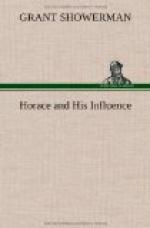Honor, too,—the fine spirit of old Roman times, that refused bribes, that would not take advantage of an enemy’s weakness, that asked no questions save the question of what was right, that never turned its back upon duty, that swore to its own hurt and changed not; the same lofty spirit the recording of whose manifestations never fails to bring the glow to Livy’s cheek and the gleam to his eye,—honor is also first and foremost in Horace’s esteem. Regulus, the self-sacrificing; Curius, despising the Samnite gold; Camillus, yielding private grievance to come to his country’s aid; Cato, dying for his convictions after Thapsus, are his inspirations. The hero of his ideal fears disgrace worse than death. The diadem and the laurel are for him only who can pass on without the backward glance upon stores of treasure.
Finally, not least among the qualities which enter into the ideal of Horace is the simplicity of the olden time, when the armies of Rome were made up of citizen-soldiers, and the eye of every Roman was single to the glory of the State, and the selfishness of luxury was yet unknown.
S_cant were their private means, the public,
great_;
’T_was still a
commonwealth, that State_;
N_o portico, surveyed with private rule_,
A_ssured one man the
shady cool_.
T_he laws approved the house of humble
sods_;
’T_was only to
the homes of gods_,
T_he structures reared with earnings of
the nation_,
T_hey gave rich marble
decoration_.
The healthful repose of heart which comes from unity of purpose and simple devotion to plain duty, he sees existing still, even in his own less strenuous age, in the remote and peaceful countryside. Blessed is the man far from the busy life of affairs, like the primeval race of mortals, who tills with his own oxen the acres of his fathers! Horace covets the gift earnestly for himself, because his calm vision assures him that it, of all the virtues, lies next to happy living.
v. THE SOURCES OF HAPPINESS
Here we have arrived at the kernel of Horace’s philosophy, the key which unlocks the casket containing his message to all men of every generation. In actual life, at least, mankind storms the citadel of happiness, as if it were something material and external, to be taken by violent hands. Horace locates the citadels of happiness in his own breast. It is the heart which is the source of all joy and all sorrow, of all wealth and all poverty. Happiness is to be sought, not outside, but within. Man does not create his world; he is his world.




